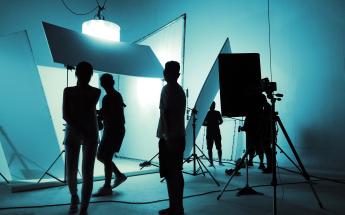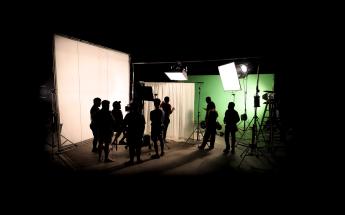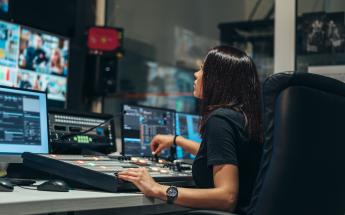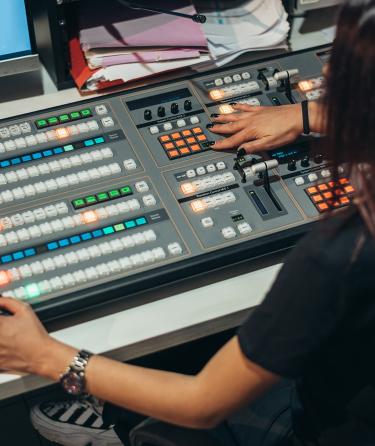Television Pathways
Plan Your Path in Television
Whether you’re aiming for a career in broadcast, streaming, or studio production, LACC’s Television program offers flexible options to match your goals, schedule, and interests.
Explore certificates and degrees that teach hands-on production, on-camera performance, studio operations, and more. From fast-track certificates to a full associate degree, each path comes with a semester-by-semester guide to help you stay on track.
Not sure where to begin? Start by choosing a goal below:
-
🎓 Earn a degree and transfer to a university
-
📺 Get certified in a specific area of television production
-
⏱️ Finish quickly with a low-unit certificate
Scroll down to see all program options—and the exact courses to take, semester by semester.
Build Your Foundation, Shape Your Future
Whether you're heading straight into the industry or planning to transfer, our Associate degrees give you the skills, support, and creative edge to take that next big step.

Film, Television, and Electronic Media
Associate in Science for Transfer
Launch your film or TV career with a degree that gets you on set and into a CSU. You'll study the art of storytelling, get hands-on with pro gear, and build a reel that opens doors. Complete the required coursework and you’ll be ready to transfer with confidence.

Television Production
Associate of Arts
Get the skills to step confidently into the world of television. This AA degree blends hands-on studio training with a deep understanding of TV history, production roles, and creative collaboration—preparing you for work both on set and behind the scenes.
Skill Up. Stand Out. Get Hired.
Jump into the industry with focused, hands-on training. Our certificate programs are designed to get you job-ready fast—with the tools pros actually use.

Unscripted Television Production
Certificate of Achievement
Learn to produce the unscripted content that keeps audiences hooked—from reality shows to podcasts to livestreams. This certificate gives you hands-on training in studio and control room operations, including technical directing, camera work, audio mixing, and live-to-tape production. You'll gain the skills needed to launch a career in television as a producer, director, camera operator, editor, or production assistant.
Explore Every Course We Offer
Use this section to explore individual courses in the Television program. You’ll find descriptions, credit info, along with tips and tricks to make the most of your experience.
Introduction to Television
TELEVISION 001 Course Description
This essential lecture course provides a big-picture overview of the television and streaming industries—from the earliest days of broadcast radio to today’s digital-first, multi-platform landscape. Students will examine how shows are made, how money is earned (or lost), how content is regulated, and how the internet and OTT platforms are reshaping the future of media.
Whether you're aiming to write, produce, direct, or promote content, this course gives you the foundational knowledge to navigate the modern TV and streaming world with confidence.
What to Expect
This is a non-technical, lecture-based course. You’ll learn through instructor-led presentations, class discussions, and video case studies.
-
Expect tests, quizzes, and group projects.
-
No cameras or editing tools are used in this course — save that for future classes!
Camera, Lighting, and Sound for Television and Cinema
TELEVISION 004 Course Description
Ready to step behind the camera? TV 4 gives you practical, hands-on experience operating professional multi-camera studio production equipment. You’ll learn the foundational techniques of lighting, camera operation, and audio—skills you’ll carry with you across all your film and television projects.
This is a required course for Television majors and a highly recommended elective for Cinema students looking to sharpen their on-set production skills.
What to Expect
This class functions like a lab—come ready to learn by doing. You’ll gain hands-on experience with:
-
HD studio cameras
-
Lighting instruments & grip gear
-
Professional sound systems
-
Video switchers and control room equipment
Program Planning Tip
Many students choose to take TELEVISION 004 alongside TELEVISION 009 (Studio Production) for the full production experience.
Studio and Remote Production
TELEVISION 006 Course Description
This is where the crew comes to shine. In this advanced production course, you’ll operate as part of a full studio team to create live-to-tape programming in a news-style format. You’ll light, shoot, and edit remote segments using professional camcorders and wireless audio systems, then bring those pieces back into the studio for integration into a larger production.
This course is all about teamwork, timing, and technical skill—ideal for students who are serious about working in professional broadcast environments.
⚠️ Note: TELEVISION 006 (crew) and TELEVISION 007 (talent) meet at the same time with the same instructor. You may not take both in the same semester.
What to Expect
-
Collaborate on a full crew to produce a half-hour studio show
-
Learn advanced live studio workflows using professional-grade equipment
-
Create, shoot, and edit remote field segments
-
Master both in-studio and on-location production tools and techniques
Television Announcing
TELEVISION 007 Course Description
This is where talent takes center stage. This performance-based, hands-on course is designed for students interested in becoming on-camera personalities for broadcast news, weather, sports, and special reports. You'll develop professional announcing skills while learning how to write, rehearse, and deliver stories using teleprompters, scripts, and interview formats.
Through studio and remote exercises, you’ll gain experience in improvisation, cold reads, and live performance—all while acting as on-camera talent in the production of a half-hour live-to-tape studio show.
⚠️ Note: TELEVISION 006 (crew) and TELEVISION 007 (talent) meet at the same time with the same instructor. You may not take both in the same semester.
What to Expect
-
Train as on-camera talent in a simulated newsroom environment
-
Master teleprompter reading and live delivery techniques
-
Write and announce your own stories for various news segments
-
Gain confidence through regular performance workshops and critiques
Introduction to TV Equipment Procedures
TELEVISION 009 Course Description
This is your gateway into the world of studio television production. Designed for beginners, this course introduces students to the fundamentals of multi-camera studio workflows—from script to screen. You’ll gain hands-on experience operating professional broadcast equipment, including video switchers, studio cameras, lighting grids, and audio systems.
By the end of the semester, you’ll direct and produce your own one-minute live-switched commercial using industry-standard control room and studio procedures.
What to Expect
-
Studio camera operation & live switching
-
Scriptwriting, storyboarding, and basic directing
-
Production design and lighting for TV
-
Audio and sound control basics
-
Hands-on practice with every piece of gear in the studio
Program Planning Tip
This class pairs perfectly with Television 004 for extra equipment training and a more complete studio experience.
Television and Film Dramatic Writing I
TELEVISION 025-1 Course Description
Learn the foundations of writing for television and film, including both drama and comedy. This course focuses on the professional methods and formats used in the industry, guiding students from idea development through script outline and teleplay or screenplay structure. Students will also gain insight into the business side of writing—how to find representation and pitch your work.
What to Expect
-
Expect to complete the first act of a teleplay or screenplay, along with several writing exercises.
-
No technical production equipment is used—this is a writing-focused course.
Television and Film Dramatic Writing II
TELEVISION 025-2 Course Description
Build on the skills from TELEVISION 025-1 with advanced techniques in story structure, character development, dialogue, and pacing. This workshop-style course gives you time and instructor feedback to revise and complete scripts begun in earlier classes or start new ones. Students write for both single- and multi-camera formats across television and film.
What to Expect
-
Perfect for students looking to polish scripts for festivals, portfolio samples, or potential development opportunities.
Television Production
TELEVISION 046 Course Description
Step into the director’s chair in this hands-on, intermediate-level course taught in the state-of-the-art Dick Clark Television Studio, funded by the Hollywood Foreign Press Association. Students will write, produce, direct, and crew a variety of live-switched studio productions—ranging from a 30-second PSA to a 10-minute segment.
Throughout the semester, you’ll gain hands-on experience with:
-
Studio camera operation
-
Lighting control and design
-
Switcher, audio mixer, and character generator
-
Production crew roles and communication
-
Scriptwriting, producing, and live directing
Each student rotates through roles on set and in the control room, developing a complete understanding of television production from concept to broadcast-ready delivery.
What to Expect
-
Expect to complete three live-switched productions: a 30-second spot, a 5-minute segment, and a 10-minute show.
-
Includes a written midterm and final exam.
Note: This is a required course for all Television majors and a recommended elective for Cinema majors.
Television Programming & Videotape Production Workshop
TELEVISION 048 Course Description
Take your production skills to the next level in this advanced writer/producer workshop, designed for students ready to lead studio productions from the top down. In TV 48, you’ll conceptualize, write, produce, and direct advanced segments using the industry-standard gear and large-scale setup of the Dick Clark Television Studio.
This course is tailored for those who want to build their portfolios as:
-
Writers
-
Producers
-
Directors
You’ll also work with:
-
Remote camera systems
-
Studio switchers
-
Special effects equipment
-
Advanced control room workflows
What to Expect
-
This course is for writer/producers only. You’ll be managing the creative vision and execution of productions—not working as on-camera talent or crew.
⚠️ Note: TELEVISION 048 and TELEVISION 049 meet at the same time with the same instructor. You must choose one—you cannot enroll in both simultaneously.
TV Production Workshop
TELEVISION 049 Course Description
Step into the control room and behind the scenes with TV 49, a hands-on course designed for students who want to specialize in the technical side of television production. This workshop is for those interested in mastering the tools and techniques of professional studio crew positions—not writing or producing.
In this advanced-level class, you'll build skills in:
-
Studio and remote camera operation
-
Lighting for multi-camera setups
-
Audio engineering and mixing
-
Live video switching
-
Character generator and graphics systems
-
Control room coordination and communication
What to Expect
-
This course is for technical crew only. You’ll be the engine that powers the production—perfect for students who want to become camera operators, audio techs, lighting designers, or technical directors.
⚠️ Note: TELEVISION 048 and TELEVISION 049 meet at the same time with the same instructor. You must choose one—you cannot enroll in both simultaneously.
Digital Video Production Workshop I
TELEVISION 055 Course Description
Take your creativity from idea to screen.
In this hands-on production workshop, intermediate students work individually to write, shoot, and edit two short digital video projects. From proof-of-concept films to polished portfolio pieces, this course focuses on developing your unique creative voice while applying professional production techniques.
You’ll gain experience with:
-
HD digital video cameras (or your own gear, if preferred)
-
Non-linear editing systems
-
On-set production planning
-
Visual storytelling techniques
-
Preparing your work for festivals, crowdfunding, and career portfolios
What to Expect
-
Create Two Short Films: Plan, shoot, and edit two original video projects — great for portfolios or festival submissions.
-
Use Professional Tools (or Your Own): Work with digital cameras and editing software provided, or bring your own gear.
-
Build Real-World Skills: Practice storytelling, camera work, editing, and set etiquette in a hands-on, collaborative environment.
Note: This course satisfies requirements for multiple certificates and is ideal for students interested in directing, cinematography, or producing short-form content.
